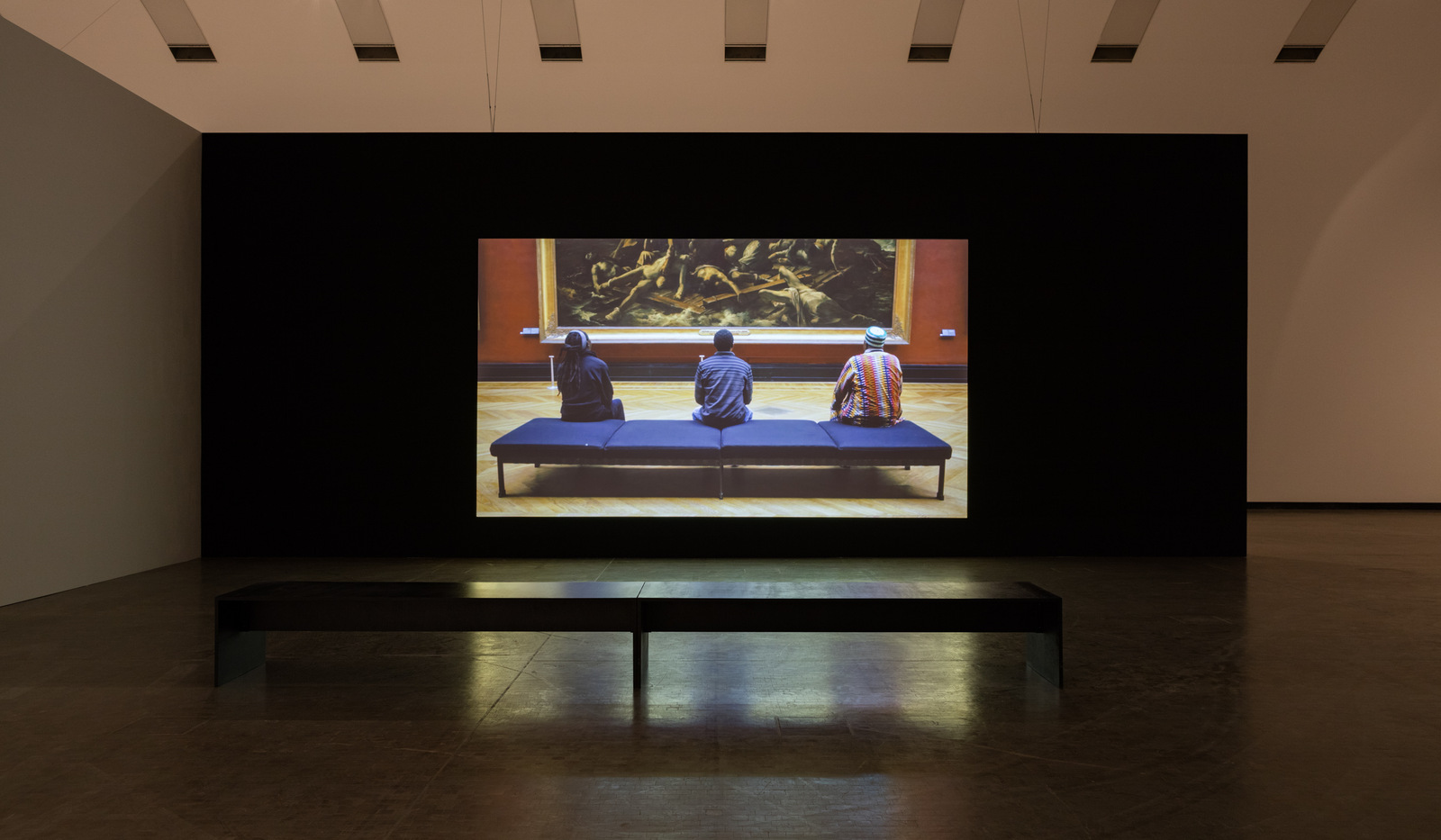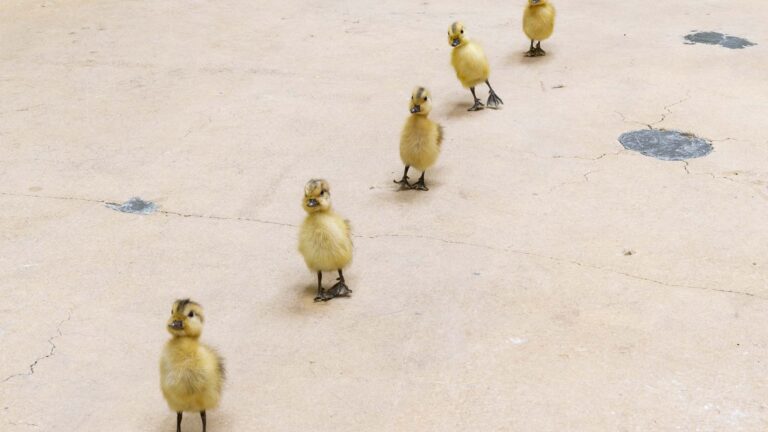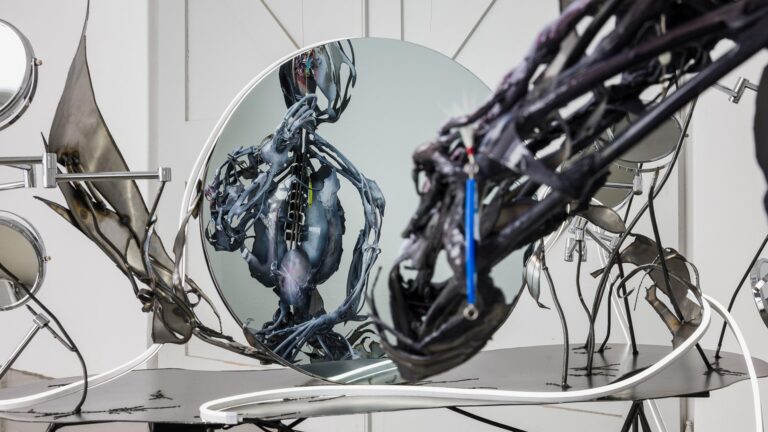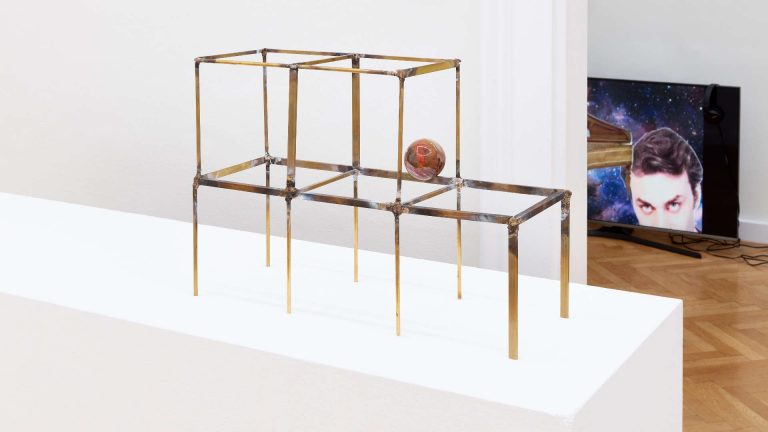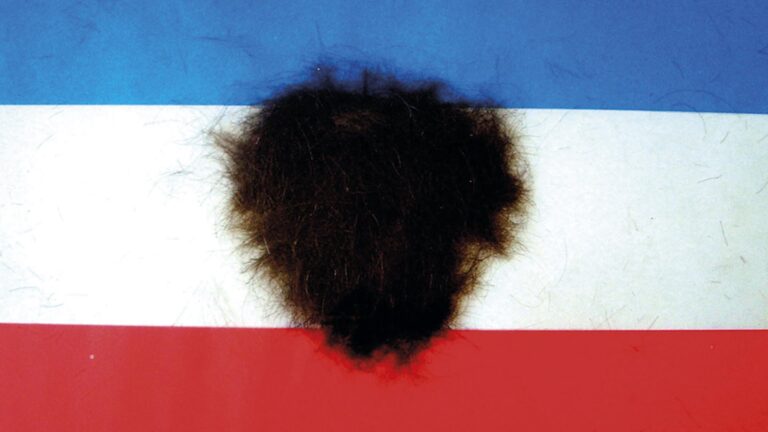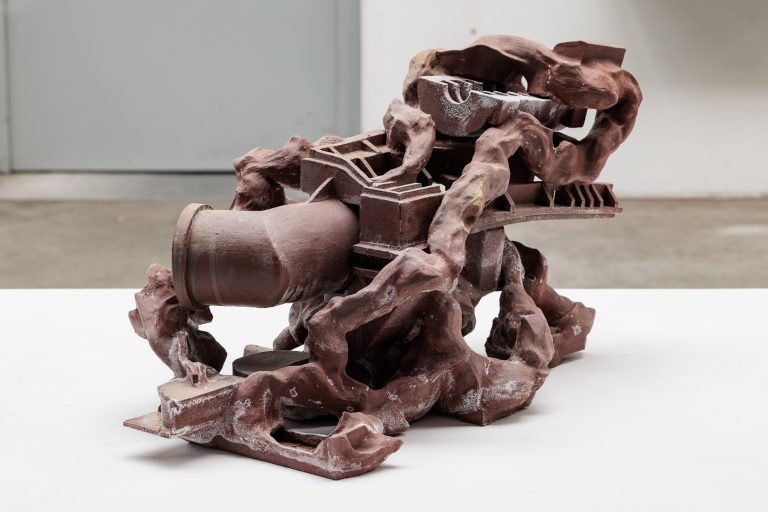Artist: Marcel Odenbach
Exhibition title: Beweis zu nichts (Proof of Nothing)
Curated by: Vanessa Joan Müller
Venue: Kunsthalle Wien, Vienna, Austria
Date: February 5 – May 1, 2017
Photography: © Stephan Wyckoff, all images copyright and courtesy of the artist and Kunsthalle Wien
Note: Exhibition booklet can be found here
Beweis zu nichts (Proof of Nothing) is the title of a poem by Ingeborg Bachmann, in which she thematizes the persistence of the victim-perpetrator structure within postwar society. Bachmann’s great admirer, Bertolt Brecht, did a slight rewrite of this poem and others by Bachmann as well, in order to emphasize his view of the topic. It might look like a subtle intervention, but it isn’t: In Bachmann’s version, the last line of the poem reads: “Wein! Aber winke uns nicht” (“Cry! But don’t wave at us”). Brecht turns it into: “Weine, nur winke uns nicht” (“Cry, just don’t wave at us”).
In 1952, Bertolt Brecht and Fritz Cremer won a competition to design a memorial for Buchenwald, the former concentration camp. In September 1958, the National Buchenwald Memorial was inaugurated. The debate about the appropriate design for the camp’s grounds and memorial dragged on for several years; it wasn’t so much about the historical or aesthetic considerations but instead was politically motivated: A better, socialist Germany had emerged from the struggle and sacrifice – this is the message the memorial was supposed to convey. Cremer’s design is directly based on Auguste Rodin’s group of figures, The Burghers of Calais. His figures – all of them men – are represented as standing on an equal footing. No prisoner stands out. Marked by the injustice they suffered, they look like they are fighting against an invisible enemy.
For his exhibition at Kunsthalle Wien, Marcel Odenbach has made a film about this memorial, which addresses the question of how memory and history can be visualized and also reinterpreted or ideologized. Bachmann’s poem is an example of seemingly unimportant “corrections” that actually offer a different perspective.
It was in his film Im Kreise drehen/Turning in Circles, that Odenbach first focused on a memorial – the one commemorating the former Majdanek concentration camp in Lublin, Poland. This film also tackles the question of how collective memory materializes and how such commemoration can be expressed in a memorial to the victims that transcends generations. These two concerns are among the central motifs informing the work of one of the most important video artists. In their intensive examination of the problem of coming to terms with the past, Odenbach’s works reflect the echo of National Socialism up to the present. At the same time, however, they take what is a specifically German concern and open it up so it can be looked at from a more universal perspective. Odenbach observes various cultures and political constellations, letting them influence his work. Reflections on the familiar and the foreign, his own biography and the biographies of others, are also important motifs in his work, which puts forth its arguments in a way that is as aesthetic as it is political.
As such, the video installation In stillen Teichen lauern Krokodile/In Still Waters Crocodiles Lurk, which thematizes the 1994 genocide in Rwanda, presents historical documentary material and excerpts from the United Nations’ film archive, but no direct images of the crime. Odenbach’s approach to a country that must do both – convict the murderers as well as reconcile its people – makes use of everyday scenes that show the beauty of Rwanda: farmers in banana fields, cows grazing on green pastures, rain falling on idyllic countryside. The hate propaganda urging the Hutu to murder the Tutsi can only be heard on the soundtrack coming from the radio. The video installation doesn’t judge what is happening and also doesn’t try to explain it. Instead, the highly suggestive images encourage viewers to form their own opinion.
Odenbach’s solo exhibition at Kunsthalle Wien shows video films and video installations side by side with collages that take up the principles Odenbach used to construct the films, so as to let the micro and macro perspectives collide and converge. While the overall view presents a motif that is easy to recognize, the close up view of details shows numerous individual images, where the motif comes together like a puzzle. The large image that is easy to recognize emerges first. Upon closer inspection, however, it disintegrates into fragments that look like they are subordinate to the larger whole, but that ultimately unfold their own unique narrative. From the tension of these two images that frequently run counter to one another, an interim space emerges, which must be filled with the audience’s own view of things. At first glance, the almost 15-meter-long collage Durchblicke (Clear Views), shows a dense tropical jungle. When viewed closely, it is comprised of numerous photos reflecting Africa’s colonial history. The second level, which sits at one remove from our immediate perception, demands that we look at it intensely from up close, where it is open to complex reference structures.
In this sense, Odenbach’s entire oeuvre calls out to address a viewer who is free from preconceptions and able to take on the present in its entanglement with the past.
Marcel Odenbach, *1953 in Cologne. Between 1974–79 he studied architecture, art history and semiotics at the Technical University, Aachen. Since 1976 he has been working with various media including video, tape, installation, drawing, and performance. Since 1992–97 he was professor for Media Art at the State University of Design, Karlsruhe, and from 2001–2010 at the College of Media Arts, Cologne. Since 2010 he has been a professor at the Art Academy Düsseldorf.
Solo exhibitions: Tel Aviv Museum of Art; Kunstmuseum Bonn; Frankfurter Kunstverein; Museo de Arte Contemporáneo de Caracas; International travelling exhibition organized by the Institut für Auslandsbeziehungen e.V. (ifa), Stuttgart; Collection Friedrichshof, Zurndor; Freud Museum, London; Hamburger Bahnhof – Museum für Gegenwart, Berlin
Marcel Odenbach lives and works in Cologne and Berlin.
Installation view: Marcel Odenbach. Beweis zu nichts (Proof of Nothing), Kunsthalle Wien 2017, Photo: Stephan Wyckoff: Im Schiffbruch nicht schwimmen können, 2011, © Marcel Odenbach & BILDRECHT GmbH, 2017, Courtesy Galerie Gisela Capitain, Cologne
Installation view: Marcel Odenbach. Beweis zu nichts (Proof of Nothing), Kunsthalle Wien 2017, Photo: Stephan Wyckoff: Beweis zu nichts, 2016, © Marcel Odenbach & BILDRECHT GmbH, 2017, Courtesy Galerie Gisela Capitain, Cologne and Anton Kern Gallery, New York
Installation view: Marcel Odenbach. Beweis zu nichts (Proof of Nothing), Kunsthalle Wien 2017, Photo: Stephan Wyckoff: Durchblicke, 2007; Jeder Schuss ein Treffer, 2009/2010, © Marcel Odenbach & BILDRECHT GmbH, 2017, Cologne, Courtesy Gisela Capitain, Cologne & Anton Kern Gallery, New York
Installation view: Marcel Odenbach. Beweis zu nichts (Proof of Nothing), Kunsthalle Wien 2017, Photo: Stephan Wyckoff: Durchblicke, 2007; Die gute Stube, 2011, © Marcel Odenbach & BILDRECHT GmbH, 2017, Cologne, Courtesy der Künstler, Gisela Capitain, Cologne & Anton Kern Gallery, New York
Marcel Odenbach, Im Schiffbruch nicht schwimmen können (Video Still), 2011, © Marcel Odenbach & BILDRECHT GmbH, 2017, Courtesy Galerie Gisela Capitain, Cologne
Marcel Odenbach, Im Kreise drehen (Video Still), 2009, © Marcel Odenbach & BILDRECHT GmbH, 2017, Courtesy Galerie Gisela Capitain, Cologne
Marcel Odenbach, Im Kreise drehen (Video Still), 2009, © Marcel Odenbach & BILDRECHT GmbH, 2017, Courtesy Galerie Gisela Capitain, Cologne
Marcel Odenbach, Durchblicke (Detail), 2007 © Marcel Odenbach & BILDRECHT GmbH, 2017, Photo: David Ertl, Cologne, Courtesy Anton Kern Gallery, New York
Marcel Odenbach, Die gute Stube, 2011, © Marcel Odenbach & BILDRECHT GmbH, 2017, Photo: Vesko Gösel, Cologne, Courtesy the artist and Anton Kern Gallery, New York
Marcel Odenbach, Deutschstunde (Video Still), 2006, © Marcel Odenbach & BILDRECHT GmbH, 2017, Courtesy Galerie Gisela Capitain, Cologne
Marcel Odenbach, In stillen Teichen lauern Krokodile (Video Still), 2002/2004, © Marcel Odenbach & BILDRECHT GmbH, 2017, Courtesy Galerie Gisela Capitain, Cologne
Marcel Odenbach, Jeder Schuss ein Treffer, 2009/2010, © Marcel Odenbach & BILDRECHT GmbH, 2017, Photo: Vesko Gösel, Cologne, Courtesy Gisela Capitain, Cologne
Marcel Odenbach, Heimat 3 (AdVB), 2016, © Marcel Odenbach & BILDRECHT GmbH, 2017, Photo: Simon Vogel, Cologne, Courtesy Galerie Gisela Capitain, Cologne
Marcel Odenbach, Meldung, 2016, © Marcel Odenbach & BILDRECHT GmbH, 2017, Photo: Vesko Gösel, Cologne, Courtesy the artist


